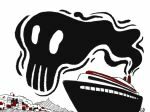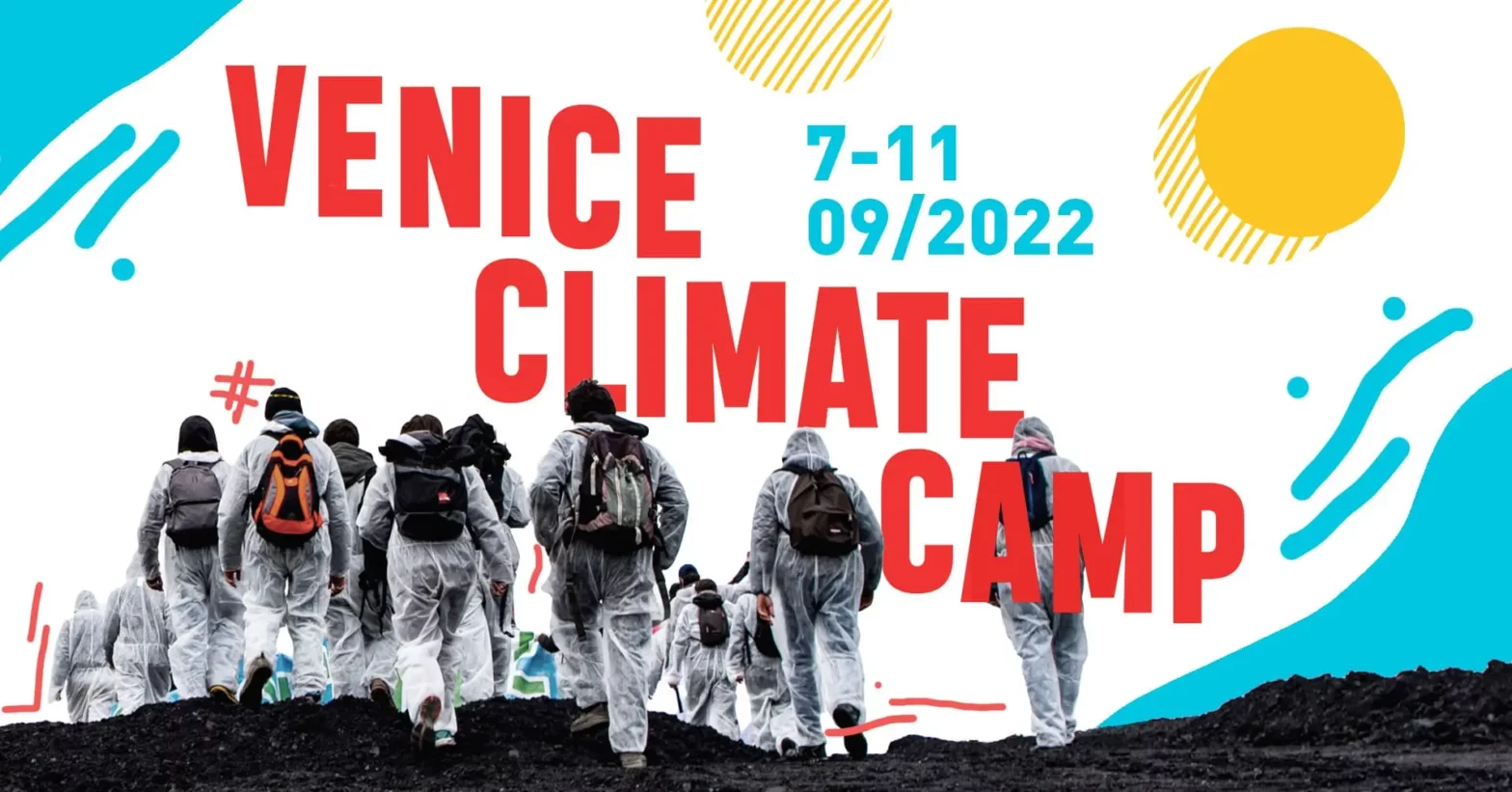At the invitation of No Grandi Navi, the anti-Croisières fight of Venice, active for 10 years to preserve its lagoon and now all the rest of the harmful consequences of cruises, Stop Cruises went to the Venice Climate Camp, 7 As of September 11, 2022 on the island of Lido. Joined by the platform against the Megapacs de Croisières de Palma de Mallorca, we exchanged during a workshop of the camp intended for the anti-crosrer struggles in Europe, to build solid bases for a new organization that we call our wishes, Ecan : European Cruise Activist Network, the European Anti-Croisières network. Our manifesto is being written and will soon be shared so that the network can extend to all the ports concerned by the impact of cruises.

Workshop report
The workshop “Present and future of cruise ships in the Mediterranean” was held on September 10 as part of the Venice Climate Camp. Comitato No Grandi Navi de Venise, stop Croisilles de Marseille, Platforma Contra El Megacreuers de Palma, We Are here Venice and Cittadini per Aria participated. The workshop represented a starting point for the creation of a European network of committees against large ships: European Cruise Activist Network (ECAN), with a particular accent on the Mediterranean area.
The first to speak was the Comitato No Grandi Navi, which told its story, of the first demonstration in which 30 people participated, in the evolution towards a movement of 10,000 people who led to a historical change in the city. A radical transformation, which made it possible to go from 16/18 ships passing through the city each weekend to 2 per week in Marghera. This is not the solution, but a big step forward compared to before, a step carried out thanks to the union of citizens, thanks to the fight from below those who live and love Venice. A not easy struggle, carried out with the awareness of having no ally in all the municipalities which have never brought real change, unlike the many people who protested, in the Calli and on the small boats. The intelligence and the strength of the committee is therefore to have been able to make different ideas cohabit on the solutions to adopt, with a continuous discussion which found in the message “bring out the boats from the lagoon” its smallest common denominator. A passage is also devoted to action: “We believe that direct action is really part of the DNA of the movement. We block ships with our small boats, we destroy the control station at the airport, we organize Assemblies, we write letters to the government, calls for tar, we organize self-organized referendums. There is no good or bad, violent or non-violent. We do everything and we believe that Each party works together for a common result. “
Finally, the committee described how the question of large ships was integrated into the climate battle. It is the movement of young people which pushes to maintain together a target of city and territory to the more complex and global climate question which affects so many aspects and problems of the city of Venice: the ships are only the emerged part of an iceberg which can only be destroyed by striking it as a whole. Mass tourism, city idea, climate. This is how the Committee managed to develop, despite the repression which first struck criminally and then economically. Only two years ago, in fact, fines of 40,000 euros were imposed. A sum that was harvested thanks to a crowdfunding which demonstrated the incredible solidarity of all those who support the committee.
The discourse ends by emphasizing the globality of the devastation brought by large ships, and the importance of the union between local struggles for a European alliance in order to denounce always stronger than large ships are a problem of a point Climate and territorial view, for Venice and all the other territories crossed by these floating monsters.
The word is then given to PlataForma Contra El Megacreuers of Palma de Mallorca, which highlights the ecological problems linked to the passage of a number of tourists extremely higher than the number of inhabitants. He continues by telling the work carried out by the Platforma Contra El Megacreuers, which was born from the union of several associations and souls of the city. This work focused on the desire to reduce the number of ships to a maximum of 3 ships and 8,000 people. Not the expected objective, but a step in a path that remains open and continues. The speech ends by affirming the importance of a European network against large ships, as opposed to the tourism and ships which is already strongly linked and united within it.
Then it is the Tour of Stop Cruises de Marseille, which recounts the increase in the number of large ships in the city, an arrival obviously linked to economic factors, which brought a large number of tourists and the increase in the level of pollution. It is a young committee which, in the last 6 months, set out to gather information, which then led to the publication of a 10 -point program (argument) which deals, among others , questions of air and water pollution and their link with climate change, economic consequences in the city, technical solutions proposed by industry in order to convince citizens of existence “green” cruises, and what can be done in Marseille and Europe. Stop Croisres also addresses the theme of actions: one of the most important was certainly the blocking of the Wonder of the Sea, the largest ship in the world. About twenty people blocked the entrance to the port of Marseille, preventing the large ship from docking for several hours. The media attention that resulted was very important for the movement. The work of the committee also focuses on the search for a counter-narration against the greenwashing of large ships and against the false solutions constantly proposed. A legal team also works on sending to the government of letters of victims of air pollution in the region, to say that what they are doing is not enough, that it is necessary to do more. The speech ends with these words: “For us, ships are a problem everywhere and we do not just want to send them elsewhere. We do not want ships and we want to reduce the impact of maritime traffic in general. The ships are Completely useless, we don’t want to compromise on this point. “
It is then the Tour of Cittadini Per L’Aria, born in 2015 with a focus on atmospheric pollution of ships. The difference in policies to limit the pollution of ships between north and southern Europe is underlined, as well as the need to make the entire maritime transport sector clean.
We Are here Venice concludes the tour of the presentations, insisting on the scientific approach that she wants to bring to the struggle. “Regarding ships, I was involved in 2010, when we went and came from Giardini (a neighborhood in Venice), there were ships right there. I am” obsessed “by the question of ships. We worked hard in these years to gather as much information as possible. In 2012, the question of Venice was too focused on the site of ships. Today, we must understand that the real question is what The cruise industry done to the planet. Last year, we started to collect all the data on the damage caused by ships and to force politicians to see the problem once it is written black on white . “
The objective of the workshop, which was the first meeting of the European cruise activists who were trained during the Venice Climate Camp, was to identify the common points for the creation of a collective path and for the Beginning of a struggle unit within the Ecan network.
Among the many problems linked to the cruise industry, there is mass tourism, aggravated even more by the arrival of cruise ships, which represents another form of profits at the expense of territories and health citizens. The workforce, which in this industry turns out to be purely seasonal, without rights and with high percentages of unsuccessful workers. The relationship between the climate crisis and cruise ships was also highly underlined. Indeed, the effects of this climate industry are numerous: the destruction of seas, oceans and ecosystems; The devastation caused by the construction of the ships themselves, by the transport of materials and their extraction, to which is added the problem of the elimination of these giants of the seas.
The gigantism of cruise ships perfectly represents in metaphor the development model of current capitalism, which exclusively aims for infinite growth, increased GDP, etc. This is a striking example of the contradiction between the permanent research of profit and the obvious necessity, dictated by climate urgency, to reduce production and consumption and to seek other lifestyles. Cruise boats are nothing more than a new slap for those who already suffer the consequences of the climate crisis.
But the objective of Ecan is not only to find common points, but also to create counter-recovery, to put into practice the points found by research in order to advance common actions from land sharing. To all this is added a reflection on the question of the work mentioned above: it is undeniable that the cruise sector is a resource for many people who experience wages which result from it. The proposal is therefore to also speak to unions and workers, because there cannot be climate justice without social justice.
The meeting was an important moment for the start of the Ecan’s trip, which expressed its desire to continue to meet again in the presence, with a first step in Marseille in 3 months, and to extend to others Mediterranean ports also, in the full desire to transform a contradiction of the local local.

